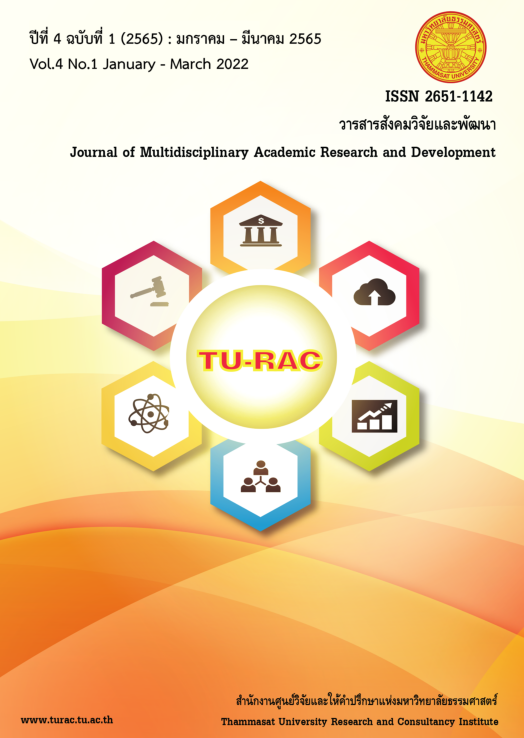Food Practices for Green Restaurant Business in Thailand
Keywords:
Green restaurant, Food practices, Restaurant business, Environmentally friendlyAbstract
A green restaurant is an eco-friendly restaurant incorporating multidimensional practices. The objective of this article is to study food practices for a green restaurant business in Thailand as significant aspects causing potential waste, pollution, and clear environmental impact. It also examines how micro and macro marketing environmental variables influence these practices. The study was conducted with 407 restaurant operators in Thailand. Data were analyzed with exploratory factor analysis (EFA) for food practices and confirmed by confirmatory factor analysis (CFA). The influence of micro and macro marketing environments on these practices by using multiple regression analysis (MRA). Results were that restaurant operators heeded food practices in importance of raw material management, standard recipes, alternative menus, food presentation, raw material and energy saving, buying processes, and food safety, in decreasing order of significance. Micro and macro marketing environment variables significantly impacted food practices at a .05 level of significance.
References
กรมพัฒนาธุรกิจการค้า. (2562). ธุรกิจร้านอาหาร. สืบค้นเมื่อ 3 มีนาคม 2563, จาก https://www.dbd.go.th/download/document_file/Statisic/2562/T26/T26_201902.pdf.
กรมส่งเสริมคุณภาพสิ่งแวดล้อม. (2564). การบริการที่เป็นมิตรกับสิ่งแวดล้อมประเภทภัตตาคารและร้านอาหาร (Green Restaurant). สืบค้นเมื่อ 15 สิงหาคม 2564, จากhttps://datacenter.deqp.go.th/service-portal/g-green/greenrestaurant/aboutg-restaurant/.
อุรพี สุวรรณเดชา. (2559). การรับรู้เกี่ยวกับร้านอาหารที่เป็นมิตรต่อสิ่งแวดล้อมที่ส่งผลต่อความตั้งใจซื้อของนักท่องเที่ยวอาเซียนในเมืองพัทยา จังหวัดชลบุรี. (วิทยานิพนธ์บริหารธุรกิจมหาบัณฑิต). มหาวิทยาลัยบูรพา, วิทยาลัยพาณิชยศาสตร์, สาขาวิชาการจัดการธุรกิจโลก.
สำนักสุขาภิบาลอาหารและน้ำ. (2561). คู่มือมาตรฐานสุขาภิบาลอาหาร "สถานที่จำหน่ายอาหาร". สืบค้นเมื่อ 20 สิงหาคม 2564, จาก https://foodsan.anamai.moph.go.th/.
BC Cook Articulation Committee. (2015). Basic kitchen and food service management. Victoria, Retrieved October 20, 2019, from https://opentextbc.ca/basickitchenandfoodservicemanagement/.
Chang, Lei. (1994). A psychometric evaluation of 4-point and 6-point Likert-type scales in relation to reliability and validity. Applied Psychological Measurement, 18(3). Retrieved November 18, 2019, from https://hdl.handle.net/11299/117059.
Cochran, William G. (1977). Sampling techniques, third edition. John Wiley & Sons, Inc., New York.
Cronbach, Lee J. (1951). Coefficient alpha and the internal structure of tests. Psychometrika, 16(3), 297–334. Retrieved December 18, 2019, from http://cda.psych.uiuc.edu/psychometrika_highly_cited_articles/cronbach_1951.pdf.
Department for Environment. (2007). A Framework for Pro-environmental Behaviours. Retrieved November 3, 2019, from http://www.defra.gov.uk/.
FAO. (2021). Food Loss and Food Waste. Food and Agriculture Organization of the United Nations. Retrieved August 13, 2021, from http://www.fao.org/food-loss-and-food-waste/flw-data.
Freeman, E. M. (2011). Restaurant industry sustainability: Barriers and solutions to sustainable practice indicators. (Master's thesis, Arizona State University). Retrieved from https://repository.asu.edu/attachments/56588/content/Freeman_asu_0010N_10634.pdf.
GRA. (2019). Green Restaurant Association Certification Standards. Retrieved October 15, 2019, from https://www.dinegreen.com/certification-standards.
Green Seal. (2019). Green Seal. Retrieved October 15, 2019, from https://greenseal.org.
Hair, Joseph., Black, William., Babin, Barry., & Anderson, Rolph. (2010). Multivariate Data Analysis (seventh edition, 2010). Pearson Prentice Hall, England.
Hu, Hsin-Hui Sunny., Parsa, H. G., & Self, John. (2010). The Dynamics of Green Restaurant Patronage. Cornell Hospitality Quarterly, 51(3), 344–362. Retrieved October 30, 2019, from https://doi.org/10.1177/1938965510370564.
Kasim, Azilah., & Ismail, Aninda. (2012). Environmentally friendly practices among restaurants: Drivers and barriers to change. Journal of Sustainable Tourism, 20(4), 551–570. Retrieved October 7, 2019, from https://doi.org/10.1080/09669582.2011.621540.
Kim, Soyoung., Yoon, Jihyun., & Shin, Joongwon. (2015). Sustainable business-and-industry foodservice: Consumers perception and willingness to pay a premium in South Korea. International Journal of Contemporary Hospitality Management, 27(4), 648–669. Retrieved October 4, 2019, from https://doi.org/10.1108/IJCHM-09-2013-0400.
Kotler, Phillip., Wong, Veronica., Saunders, John., & Armstrong, Gary. (2005). Principle of marketing (Fourth European Edition). England. Pearson education Limited. Retrieved from http://library.wbi.ac.id/repository/212.pdf.
Laurens, Joyce. (2012). Changing behavior and environment in a community-based program of the riverside community. Petra Christian University. Procedia-Social and Behavioral Sciences, 36 (2012) 372-382. Retrieved August 13, 2021, from http://dx.doi.org/10.1016/j.sbspro.2012.03.041.
Leer, Jonatan. (2020). Designing sustainable food experiences: Rethinking sustainable food tourism. International Journal of Food Design. 5(1&2). Retrieved August 13, 2021, from https://doi.org/10.1386/ijfd_00010_1.
Mashhadi, Aazir Hammad., & Ijaz-Ur-Rehman, Qazi. (2012). Impact of External Environment on the Performance of the Fast Food Industry. International Journal of Management, Economics and Social Sciences 2012, 1(1), 19 –25. Retrieved October 7, 2019, from https://www.econstor.eu/obitstream/10419/62014/1/723713944.pdf.
Nordic Swan. (2019). The Nordic Swan Ecolabel. Nordic Ecolabel. Retrieved October 7, 2019, from http://www.nordic-ecolabel.org/product-groups.
Nyheim, Peter. (2012). Factors That Lead to Environmentally Sustainable Practices in the Restaurant Industry: A Qualitative Analysis of Two Green Restaurant Innovators. (Doctoral dissertation. the Pensylvania State University). Retrieved October 5, 2019, from https://etda.libraries.psu.edu/files/final_submissions/7508.
Oraman, Yasemin., Unakıtan, Gokhan., Konyalı, Sema., & Başaran, Burcin. (2018). What External and Internal Factors Affect Organic Food Sector?. Journal of Science, 7(2). Retrieved October 15, 2019, from https://www.researchgate.net/publication/330396909_What_External_and_Internal_Factors_Affect_Organic_Food_Sector.
Ritchie, H. & Roser, M. (2020). Environmental impacts of food production. OurWorldInData.org. Retrieved August 13, 2021, from https://ourworldindata.org/environmental-impacts-of-food.
Rovinelli, Richard J., & Hambleton, Ronald K. (1977). On the use of content specialists in the assessment of criterion-referenced test item validity. Retrieved August 13, 2021, from https://www.semanticscholar.org/paper/On-the-Use-of-Content-Specialists-in-the-Assessment-Rovinelli-Hambleton/14a18d4b0d4694911ff32b20de7f1f090088012e.
Salzberg, Anna. (2016). Adopting Sustainability Innovations in Restaurants: An Evaluation of the Factors Influencing Owner-Managers’ Decisions in Richmond, Virginia. (Doctoral dissertation. Virginia Commonwealth University). Retrieved October 5, 2019, from https://scholarscompass.vcu.edu/etd/4575/.
Sao, Ameet. (2014). Research Paper on Green Marketing. IOSR Journal of Business and Management, 16(5), 52–57. Retrieved October 4, 2019, from https://doi.org/10.9790/487X-16515257.
SRA. (2019). The Sustainable Restaurant Association. Retrieved October 15, 2019, from https://thesra.org/.
Tuver, Ilgaz Feray., & Guzel, Berrin. (2017). In a "green" restaurant, what makes the customers satisfied? The restaurant attributes of Trip Advisor reviewers. Kastamonu University Journal of faculty of Economic and Administrative Sciences, 18(1).
Wang, Ray. (2012). Investigations of Important and Effective Effects of Green Practices in Restaurants, Elsevier Enhanced Reader. Retrieved November 11, 2019, from https://doi.org/10.1016/j.sbspro.2012.03.166.
Downloads
Published
How to Cite
Issue
Section
License
Copyright (c) 2022 ยศพิชา คชาชีวะ, ศิริเดช คำสุพรหม, จิราพร ชมสวน

This work is licensed under a Creative Commons Attribution-NonCommercial-NoDerivatives 4.0 International License.



